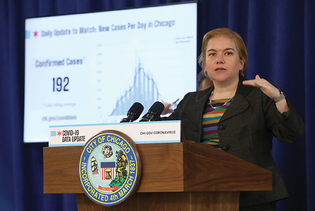
Heidi Ziegler
Allison Arwady
Health Commissioner
By Randi Hutter Epstein ’90MD
After Allison Arwady ’08MD finished her first year of medical school, she worked for the summer with a team of HIV educators in rural South Africa. It was shocking, she says, to be in an area that had no HIV medicine, a fragile water system, and no paved motorways, when just a few miles away was a pristine road that brought tourists to Kruger National Park.
Arwady has had several on-the-ground experiences; she ventured overseas again as a medical student and also during her residency at Yale. She credits them, along with her training in the classroom and on the wards, for instilling her passion for public health. They also helped her create her own framework for curtailing an epidemic—one that she has relied on in her new job.
This past January, just a few days after the COVID-19 pandemic struck, Arwady officially became the commissioner of the Chicago Department of Public Health. Within weeks, she was on television announcing the city’s first case of COVID, which was America’s second case. Since then, she has directed a coordinated effort to control the pandemic in one of the most densely populated cities in America, while tending to ongoing public health concerns such as the opioid epidemic, maternal-fetal care, violence, mental health, and food distribution. She also volunteers one evening a week as a primary-care physician in Chicago’s largest free clinic.
She calls her system for disease outbreaks the Four C’s: Coordination, Cases, Containment, Communication. Most health workers focus on cases (taking care of people) and containment (contact tracing). “You can have beautiful clinical care of cases and fantastic containment plans,” she says, “but if you don’t have coordination and communication, the whole thing falls apart.”
Arwady rattled off her daily routine for me at a rapid clip. She’s up by 6 a.m. to check COVID statistics, leaves for her office by 7:15, and by 8 a.m. she’s on a call with Mayor Lori Lightfoot, going over data and policy. From there, her schedule is packed with Zoom meetings. Sometimes she joins a door-to-door team meeting with residents and caregivers at health facilities to assess their needs.
“This whole thing has been an unbelievable hit to human life and economic life and social life, and we are a very long way off from being done with it,” she says. “But if there is one thing in all the world I’m trained to do and where I get energy from, [it’s] this work.”
Arwady earned a master’s in public health at Columbia before attending Yale for medical school and a residency that combined pediatrics and internal medicine (including an additional year as chief resident). After Yale, she served for two years in the CDC’s Epidemic Intelligence Service office, which trains doctors to lead outbreak investigations. During her stint, she went to Liberia twice for Ebola outbreaks and once to Saudi Arabia for a Middle East Respiratory Syndrome epidemic.
Before being appointed Chicago’s commissioner of health, Arwady served as the city’s chief medical officer for four years. In that time, adolescent immunization reached an all-time high, and teen smoking and birth rates dropped to an all-time low.
Arwady’s curiosity extends far beyond the sciences. When she arrived in Chicago five years ago, she read voraciously about its history and architecture, and became such an avid fan of her adopted city that she serves as a volunteer guide giving walking and boat tours. She adds a public health twist, of course.
 loading
loading